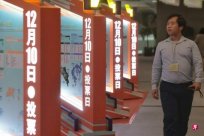"Have you watched the Queen of the News?" Hong Kong Wi -Raid TV (TVB) recently aired the Queen of Taiwan ’s Head Headprojin News. Due to the novel themes and the festive plot, the wave of watching was launched after the broadcast, which also attracted a lot of attractionMedia workers have been watched, and they have ranked first in the ratings for two consecutive weeks.
But the Queen of the News is very popular and has not saved the trend of TVB.Wireless, as the most influential TV station in Hong Kong, has often lost money in recent years. At the end of last month, it also announced the two major businesses of restructuring TV broadcasting and e -commerce, including reduced free TV channels by one to four, and merging two of its two online shopping platforms.For one.These two actions were cut about 300 employees.
According to the estimation of TVB, adjusting the TV channel can save an additional 100 million Hong Kong dollars (S $ 17.1 million) for the company next year, and reorganization of e -commerce business is expected to save up to 60 million Hong Kong dollars.TVB this time is obviously to reverse the situation of "burning money" in recent years.
According to the Hong Kong Ming Daily, in addition to the TVB restructuring business and layoffs, another TV station, HOY TV, also intends to reduce sports programs.HOY TV has been sentenced to a company in a company for many years. It is reported that the contract will no longer renew the contract after the contract will be expired at the end of this year, and reorganize the program.
It is worrying that it is not a unique problem for the Hong Kong media industry to operate.For example, the Hong Kong Economic Daily Group announced at the end of last month. As of the end of September this year, the group lost 20.265 million Hong Kong dollars.Facing the same situation, there are Ming Pao.As of the end of September, the newspaper's parent company World Chinese Media Group recorded a loss of US $ 2.186 million (S $ 2.924 million) in the quarter.
In fact, the traditional media industry in Hong Kong has appeared in the cold winter many times in the past 10 years, and many newspapers have been suspended.Judging from recent data, the cold winter of Hong Kong media has not yet passed.The traditional media industry is facing a huge challenge from social media, which seems to be beyond the imagination of outsiders.
Looking back at the development history of the Hong Kong media industry, one of the golden periods was in the 1990s.In 1995, the Apple Daily was launched, breaking the style of Hong Kong's traditional newspaper, forcing other newspapers to adopt different strategies.For a time, the Hong Kong newspaper industry was full of flowers and developed rapidly.
Another peak of the Hong Kong media industry is in the millennium.In 2002, the Metropolitan Daily was founded and became the first free newspaper in Hong Kong.Headline Daily AM730, etc., joined the battle in 2005, setting off a free newspaper boom.At that time, the total number of free distribution alone had reached 1.1 million, which was similar to the total circulation of paid newspapers.
But this boom has not lasted for a long time.Since 2012, the new media in Hong Kong have sprung up. More and more readers have abandoned traditional media and turned to several eye -catching online media, which has led to increasing difficulties in the operation of traditional newspapers and continued to decline in income.
If the reason why the Hong Kong media had flourished before is because readers' demand for information is huge, then the dilemma faced by Hong Kong media in the past 10 years is because in the era of information, readers have a great demand for information on the media.reduce.Moreover, with the increasing popularity of smartphones, readers' reading habits have changed, and fewer and fewer readers read physical newspapers and use mobile phones to absorb information.At the same time, many companies have also reduced advertising in newspapers and changed their investment to social media like Facebook.Under the double pinch of readers and advertising revenue, traditional printing media are naturally more and more difficult to survive.
In all fairness, the traditional Hong Kong media has also tried transformation and response.In recent years, most media have begun to combine paper networks to actively develop online news. Even serious financial newspapers such as letter newspapers have invested a lot of resources in new media, but not all transformations can be successful.The content of these media needs to be unique and in -depth in order to attract readers, and what's more important is that their online operations have little income. Even if there are, advertising revenue often needs to be divided with online platforms.This is a big dilemma for Hong Kong's printing media to turn to the Internet platform.
As for online media, in recent years, it has also been operating tightly. Most of them can only be operated by online donations. So far, they have not successfully opened up profitable operation models.
In short, the traditional Hong Kong media has continued to shrink in the past 10 years.Another deep -seated reason is related to the changes in Hong Kong's political situation.
After the return of Hong Kong in 1997, the social movement was overwhelming, providing a lot of news materials for the media industry.In Hong Kong, a city with a population of only 7 million, rarely has dozens of newspapers, and there are many types. There are both public newspapers, as well as serious newspapers, economic newspapers and pro -China newspapers.Each newspaper has different styles and different positions, and has different readers.However, after the implementation of the Hong Kong National Security Law in 2020, many news media announced the suspension of publication. In addition, Hong Kong's society has become stable in recent years, and there is no news that has not attracted readers. The number of readers has continued to decline, and advertisers have also reduced the resources of the newspapers.
As the media industry gradually declines, I am afraid that there will be some Hong Kong newspapers in the future.However, after all, Hong Kong is a media information hub in the Asia -Pacific region, which is also an important part of Hong Kong's economic prosperity and development over the years.How to revitalize the glory of the media industry in the media is a question that all sectors of society need to think.



